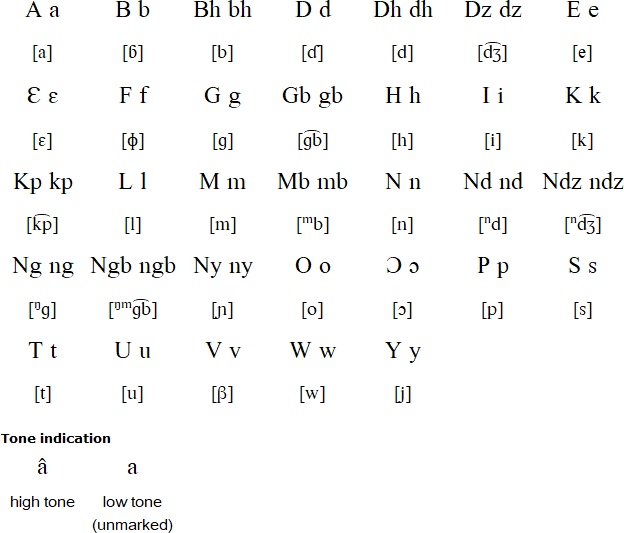Aka is a Bantu language spoken by about 30,000 people in the Central African Republic (CAR) and in the Democratic Republic of the Congo (DRC). In particular, it is spoken in along the Ubangi River, which runs along the border between the two countires, in the Lobaye and Sangha-Mbaéré prefectures in the southwest of the CAR, and in the Likouala department in the northwest of the DRC
Other names for Aka include Yaka, Beka, Mò-Áka, Moyaka, Bayaka, Yaga, Bayaga, Gbayaka, Biaka, Beká, Yakwa, Yakpa, Yakpwa and Nyoyaka. The Aka people call themselves Mraka (singular) / Beka (plural). Aka is closely related to the Baka languages of Cameroon and Gambia.
An orthography for Aka using the Latin script was launched in December 1999 by Dominique Kosseke and Yérôme Sitamon of SIL Bangui. It is based on phonological data gathered between 1992 and 1997.

Download an alphabet chart for Aka (Excel)
Bafɔ̂kɔ̂ bakɔpɛ bâbâyê bâduâyê na ndîmâ. Bɛ̂ɛnɛ̂ bâlongânɛ̂ baîto ka mû lângɔ wûmɔtî. Bɛ̂ɛnɛ̂ bâduânɛ̂ na ndîmâ têêê, wâgasê mokɔpɛ bô wâfisɛ mîsɔ bô, nyama adzɛ̂ɛ molâlɛ̂ mû sɔ̂pɔ̂. Yɛɛ̂ na kangâyê bô: « Bêka ê, yaâ î talɛ nyama âdzɛ molâlɛ̂ wû! »
One day, two sons-in-law went to the forest. Both had married their wives in the same camp. In the forest, they walked for a long time and when one of them wanted to take a look around, he saw a dead animal on the ground.
Source: Déclaration dʼorthographe pour la langue aka. Dominique Kosseke and Yérôme Sitamon. 1999.
Information about Aka
https://en.wikipedia.org/wiki/Aka_language
https://de.wikipedia.org/wiki/Yaka_(Sprache,_Zentralafrikanische_Republik)
http://www.language-archives.org/language/axk
https://www.sil.org/resources/search/language/axk
https://glottolog.org/resource/languoid/id/yaka1272
Aka, Aushi, Bafaw-Balong, Bangi, Bangubangu, Basaa, Bemba, Bembe, Bena, Benga, Bhaca, Bila, Bube, Budu, Bujeba, Bukusu, Bulu, Bushong, Central Kilimanjaro, Central Teke, Chichewa, Chokwe, Chopi, Chuwabu, Comorian, Dciriku, Digo, Duala, Eton, Ewondo, Fang, Fuliiru, Fwe, Ganda/Luganda, Giryama, Gogo, Gungu, Gusii, Gwere, Gyele, Haya, Hehe, Herero, Ibinda, Idaxo-Isuxa-Tiriki, Ikizu, Ikoma, Jita, Kabwa, Kako, Kalanga, Kamba, Kanyok, Kiga, Kikuyu, Kimbundu, Kinyarwanda, Kirundi, Kisi, Kobo, Kogo, Komo, Kongo, Konjo, Koti, Kuhane, Kukuya, Kunda, Kuria, Kwambi, Kwangali, Kwasio, Lambya, Lega, Lengola, Lingala, Loma, Lomwe, Lozi, Luba-Katanga, Luchazi, Lunda, Luvale, Luyana, Makaa, Makonde, Makhuwa, Mandekan, Maore, Masaaba, Mbama, Mbere, Mbosi, Mbugu, Mbukushu, Mbunda, Mbuun, Mende, Mongo, Mpiemo, Mushungulu, Mwani, Myene, Nambya, Nande, Ngoni, Ngwii, Njebi, Nkore, North Teke, Northern Ndebele (South Africa), Northern Ndebele (Zimbabwe), Northern Sotho, Nyamwezi, Nyakyusa, Nyemba, Nyole, Nyoro, Nyungwe, Nzadi, Oroko, OshiWambo, Pagibete, Pare, Punu, Rangi, Ronga, Safwa, Seki, Sena, Sengele, Shambala, Shona, Soga, Songe, Southern Ndebele, Southern Sotho, Suba, Sukuma, Swahili, Swati, Taita, Talinga, Tanga, Tembo, Tetela, Tonga, Tongwe, Tooro, Tshiluba, Tsonga, Tswa, Tswana, Tumbuka, Turu, Umbundu, Venda, Vili, Vwanji, Wanzi, West Teke, Xhosa, Yakam, Yansi, Yao, Yasa, Yeyi, Zigula, Zinza, Zulu
Languages written with the Latin alphabet
Page created: 25.02.25. Last modified: 01.06.25
[top]
You can support this site by Buying Me A Coffee, and if you like what you see on this page, you can use the buttons below to share it with people you know.

If you like this site and find it useful, you can support it by making a donation via PayPal or Patreon, or by contributing in other ways. Omniglot is how I make my living.
Note: all links on this site to Amazon.com, Amazon.co.uk
and Amazon.fr
are affiliate links. This means I earn a commission if you click on any of them and buy something. So by clicking on these links you can help to support this site.
[top]